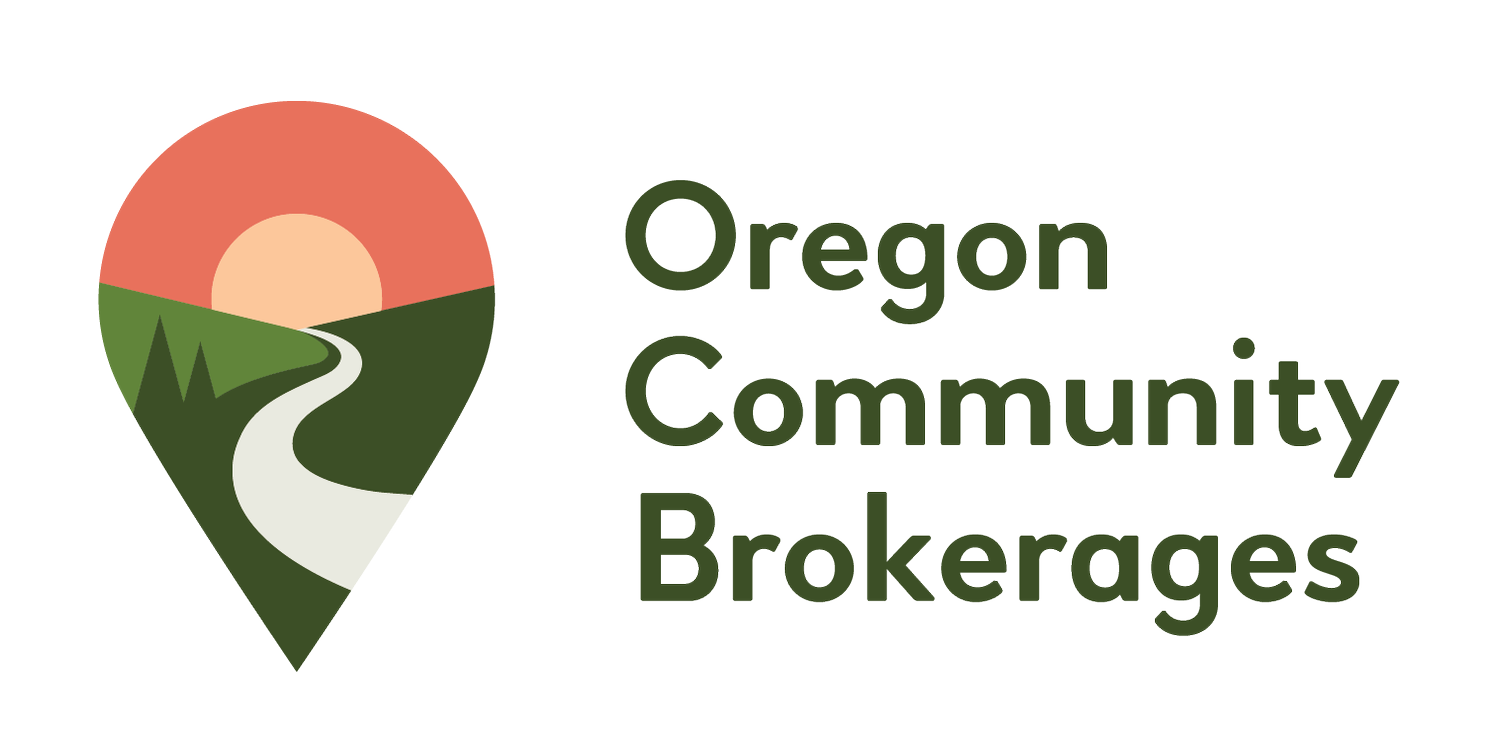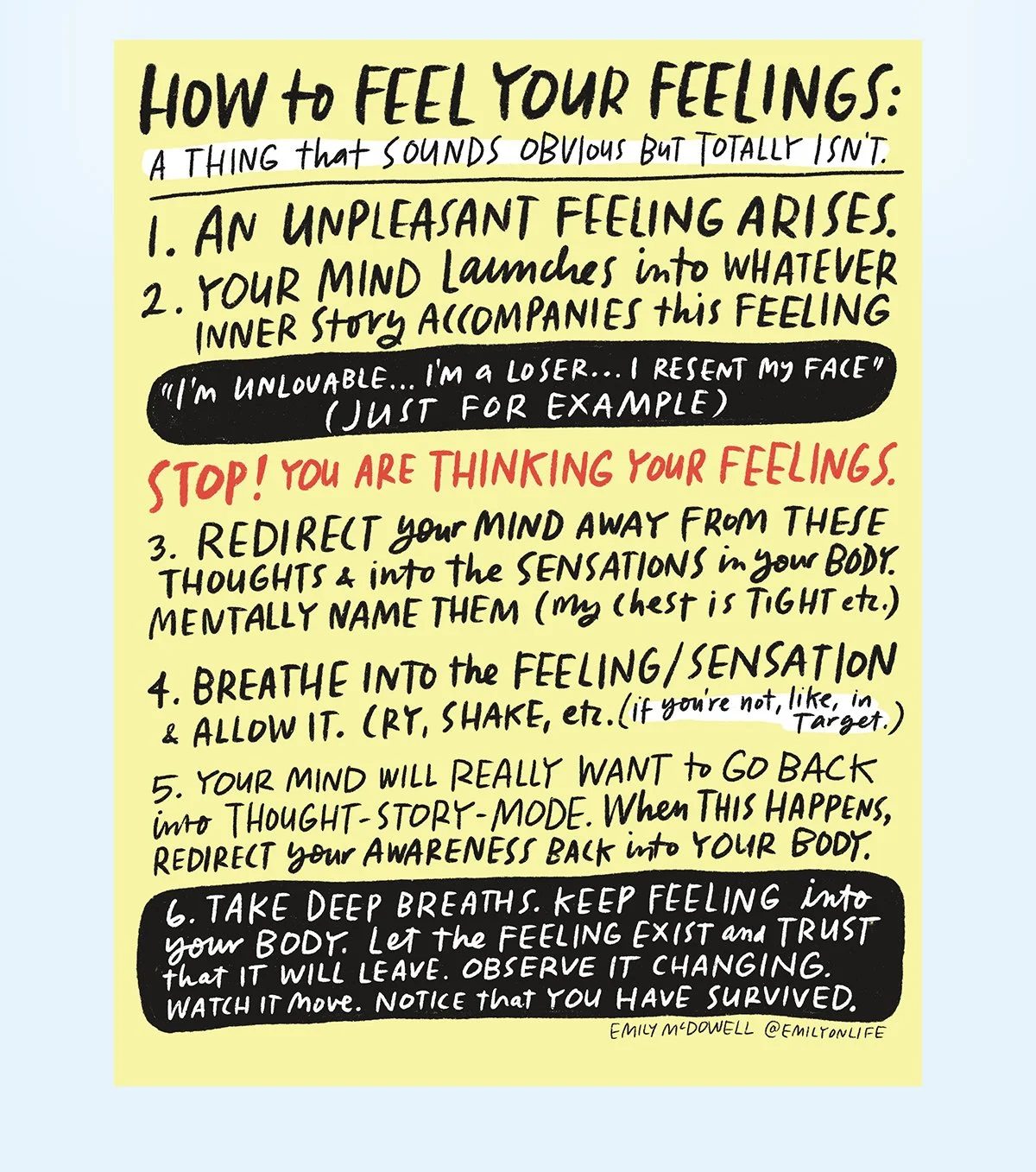Social and Emotional Wellness While Staying Home
Oregonians all across the state have worked hard to keep up with the changing rules and realities of the COVID-19 pandemic. It asks of us a near-constant recalculation that is exhausting: is it okay for me to engage in this action? How can I get this need met safely? Am I doing everything I can do for the people who matter to me? What can I do now to prepare for what's next? Our logical brains are overloaded, and our emotions are all over the place, as we grieve habits and people lost to us, and worry about the world around us. How do we maintain our emotional and mental wellness, in this time and place?
It starts with introspection. To know what you need to do to support yourself, you need to identify what is working, and what's not.
How To Feel Your Feelings by Emily McDowell
Consider the pain points, or difficult parts of your life right now. Is it centered around missing an activity? A person? Or is it around managing something essential that is now more difficult? Are you feeling too scattered? Too busy? There may be more than one thing not working well right now, but it will help to be honest with yourself about the root of your frustration, or feelings of loss.
Know that all of us struggle without our routines, to different degrees. Human beings like to have some predictability built into our daily lives. Right now, we find ourselves in a new situation that doesn't have a predictable or known course to follow. With "normal bad" events, like natural disasters or personal loss, we suffer, but we do have an inkling of what the path to recovery might look like. We know the signs that life is getting better, and where to get help if it's not. With the COVID-19 pandemic, we don't know exactly how this will play out, and what it will mean for us, and that is uncomfortable. We were all caught flat-footed by this event, with little to no time to prepare, or plan to be limited in our daily life. And that makes us want to plan ahead now for whatever comes next, and be prepared this time; but without a crystal ball, that details of how to do so just aren't there.
A side note, about stay-at-home orders, and our IDD community: Oregon's choices in not-so-distant history have made it more difficult for some members of our IDD community to believe and comply with stay-at-home orders. Our society has a history (and, in some places, present) of restricting the freedoms of people with IDD for the convenience of the service system. That is often experienced as trauma. Now we are saying that they should stay home, be denied their routines and little luxuries, lose connections with work and social circles, for the greater good. Why should they believe us? Many Oregonians in the IDD community lived at the Fairview Training Center or Eastern Oregon Training Center, and this situation of restriction and isolation may be triggering memories and feelings in them that interfere with their ability to negotiate life under COVID-19.
After you have spent some time sitting with your feelings, and thinking about what is stressing you out the most, consider this list of supports you can put in place for yourself to make each day better:
Writing out a schedule can provide some guidance and structure that many of us find satisfying.
Create more structure for yourself and your days. Plan for your week by considering what you want to accomplish. How do you want to spend your time? For most of us, if we are not intentional about how we spend our hours, they tend to slip away from us without much to show or distinguish themselves. For some people, this feels good and right. But if you are someone who feels discomfort with "getting nothing done," you should set some small goals to help differentiate each day.
To start, make a list of small, achievable goals: read a book, put together a puzzle, plant some seeds, try a new recipe, practice playing an instrument, make a favorite comfort food, take a walk in your neighborhood, pull some weeds outside, take a picnic lunch outside, or make plans to call a friend. Now you can use this list to create a schedule for yourself, scattering a couple of these activities across each day of the week.
A tip: if you find yourself drawn to a big goal that you want to accomplish (learning a new language, building something, cleaning out a room, learning a new vocation), it's okay to add it to your list. But, as you do so, think about how you will break this big goal into smaller steps. If you want to plant a garden, you may want to break it into steps such as: make a list of the things you want to grow, research how much space each item needs and how much sunlight, investigate a good location for the garden based on that information, take stock of the tools you have, make a list of the tools you need, make a list of the supplies you need, figure out where you can get these supplies, etc. Big projects have many steps! Our success with them usually depends on our ability to plan out how to achieve those steps. Ask for help with this if you need it: Do you have a friend or family member who is good at planning? Enlist them to help you out. Do you know a wonderful gardener? Ask them for advice on where to get the best supplies, and have them double-check your work plan to make sure you have the right steps for success.
Structure might also look like a daily schedule. Think about what daily activities you need to maintain to stay healthy, happy, and to maintain your living space. Use these to create a daily plan, such as:
8:00: Get up, take a shower, get dressed, eat breakfast
9:00: Do yard work if weather permits, or do some cleaning in the house
10:00: Have a phone call or video chat with a friend or family member
11:00: Plan out meals, take stock of supplies needed, and add to the shopping list
12:00: Make and eat lunch
1:00: Watch a tv show
2:00: Sort and do a load of laundry, and wash some dishes
3:00: Work on a puzzle
4:00: Write a letter or email to a friend
5:00: Make dinner
6:00: Clean up and wipe down the kitchen
7:00: Bang the pots to thank front-line healthcare workers!
Evening: Watch a movie, plan a video game, read a book, talk with your family, etc.
You can adapt it to fit you--make it more detailed, if that makes you feel more secure, or looser, with bigger blocks of time. The key is to come up with a schedule that provides support to your day, without making you feel hemmed in. Draw it out (perhaps with your favorite colors!) and post somewhere to help remind you.
Just as with physical property, we sometimes need to create and share our boundaries around our time, our bodies, and our energy.
Set boundaries and limits for yourself and others. For some people, this state of "isolation" is actually a bombardment of requests and expectations for contact. Friends are looking to connect and spend time together. Coworkers need your support. Family members want some face-time with you. And all of them know that you're home and close to your phone or computer, all day and all night. Being instantly available to everyone who may want to communicate with you can feel really reassuring and supportive to some people, and incredibly overwhelming and stifling to others. We all have different thresholds for how much human interaction is the right amount. If you are finding that it's too much and you need more space, try resetting proper boundaries for yourself and the people you care about. Sit down and do some thinking to hone in on what aspect of communication is causing you stress, and that may lead you to the best solution.
Are your unanswered texts are piling up and menacing you? Let your friends know that you are struggling to keep up with texts, and may not be able to reply; ask them not to take is personally. If you like, set up a specific schedule for when you'll respond, either to know and organize yourself, or to share out with other people to help manage their expectations.
Perhaps it is work communications that are overwhelming you. Most of us no longer leave an office or worksite at the end of the day. Without that cue to our bodies and minds that we are off work, it can creep into our down time, blending everything together. That can lead to feeling burned out, and can actually make us less productive. Have a conversation with your supervisor about putting up the boundaries you need around work communication. Stop checking email between certain hours. Set a time for routine check-ins each week to keep your communication focused and productive. Find ways to share what you're doing that don't require a conversation, like updating an online calendar.
Too may requests for FaceTime or virtual hangouts? See if there might be ways to combine requests into a single time frame--i.e., chatting with two friends together. Create a schedule or "social hour" when you'll be free to socialize, and let friends know when that is and how to contact you during that time. Make sure that you have carved out time to be "on" and time to be "off" during each day.
Sometimes it can be important to log off from social media to get in a healthy mental space.
Be intentional about your media intake. You can set boundaries with more than just people. The media we consume should also be under consideration. How often to you have the television news on? How often do you read news and other reports on your smart phone or tablet? While it is important to stay current and informed on this global public health situation as it unfolds, an environment where we are constantly being engaged by scary and concerning media reports can be unhealthy for the mental health of many of us. Set limits on the time you spend consuming news media, as well as the sources of your news. Take a look at this media bias tool from Ad Fontis Media that shows various news sources by political bias and reliability. Reacting to biased and unreliable news sources can add greatly to our stress levels.
News isn't the only source of media. Many of us engage in social media use on a regular basis, in one format or another. During this time of physical distance, social media is a lifeline for many, allowing them to keep up with friends and share their thoughts from afar. For others, social media has become overwhelmingly active, with more people in their sphere posting and sharing, requesting responses and in-put. Take your own personal "temperature" on a regular basis. If you need a break, please know that you can take time away from social media whenever you need it. It can be a healthy practice to intentionally disengage from social media for a time period of days or weeks, to unwind our thoughts and let our minds free of those thought patterns. If you can, do let your circle know that you'll be taking some time away, so that they don't become unduly worried about you. It doesn't have to be a dramatic moment, just an act of self care in a difficult time.
Take a game or book outside for a change of scenery.
Get outside, move your body. It's springtime in Oregon! If you can make it outside, to a yard, a walk, or a nearby park, it will do your soul some good. Renewal and growth are all around, and they don't care a whit about COVID-19. Soak in a little sunshine, splash in a puddle if you like. It can be fun to bring your camera for a "photo safari" to capture your favorite plants, animals, and other sights you might encounter on your adventure. Focus on engaging all of your senses: what do you smell? What do you feel? If you like writing, bring a journal along to capture some of your observations.If you are typically more physically active, make sure that you are finding ways to move and challenge your body. Too much time sitting or laying down can actually make our bodies sore, and cause our muscles to lose strength. If the weather is not cooperating, or you don't have a physically distant safe spot for exercise, check out exercise routines on YouTube or other online sources. Hosting your own dance party is another great way to get exercise--even a dance party of one! Be sure to stretch before and after any physical activity. Your muscles will thank you.
Check in on your mental health. We've never lived through a situation like this before. It's new, it's often frightening, and we don't always have our usual coping mechanisms available to help manage our feelings around all of it. This is an important time to be gentle with yourself, and check in frequently with an honest assessment of your mental health. Are you keeping yourself nourished? Are you taking your medications and doing the things you need to maintain your health? With so much of our lives fundamentally altered right now, it can be easy to feel like all bets are off and nothing matters. If you find yourself struggling with feelings of depression or anxiety, talk to someone you trust about those feelings. If you already have a mental health diagnosis, perhaps you can speak to a doctor via telehealth to describe how you're feeling. Please read this excellent article about acknowledging your feelings and taking care of your mental health, from our member organization Community Pathways. You don't deserve to suffer in silence.
An excerpt from Good Days and Bad Days During Lockdown depicting a good day.
If you know someone who works better with images, these socialstories about COVID-19 from Beyond Words are a wonderful way to help someone walk through the complexities of our current situation:
Good Days and Bad Days During Lockdown
When Someone Dies From Coronavirus
You may also want to try out meditation as a practice to help you calm your anxieties and focus your mind. There is a great compilation of free meditation resources to be found in this article, from podcasts to videos. Mindful.org also has a great collection of quick lessons to learn better approaches to stressful situations.This experience, in all its painful and joyful learning, is now a part of our shared history. We will be changed. Our methods, where we expend our energy, and what we do with our resources will be changed. What can we learn? Some of the changes our society has made for COVID-19 have enfranchised members of our IDD community in ways they never have been before. For others of our community, these practices have limited them and excluded them in ways that are painful and difficult. Our actions and our new ways of being in the future need to consider and learn from all of those experiences. In this difficult passage of history, we have an incredible opportunity to be better, together.






